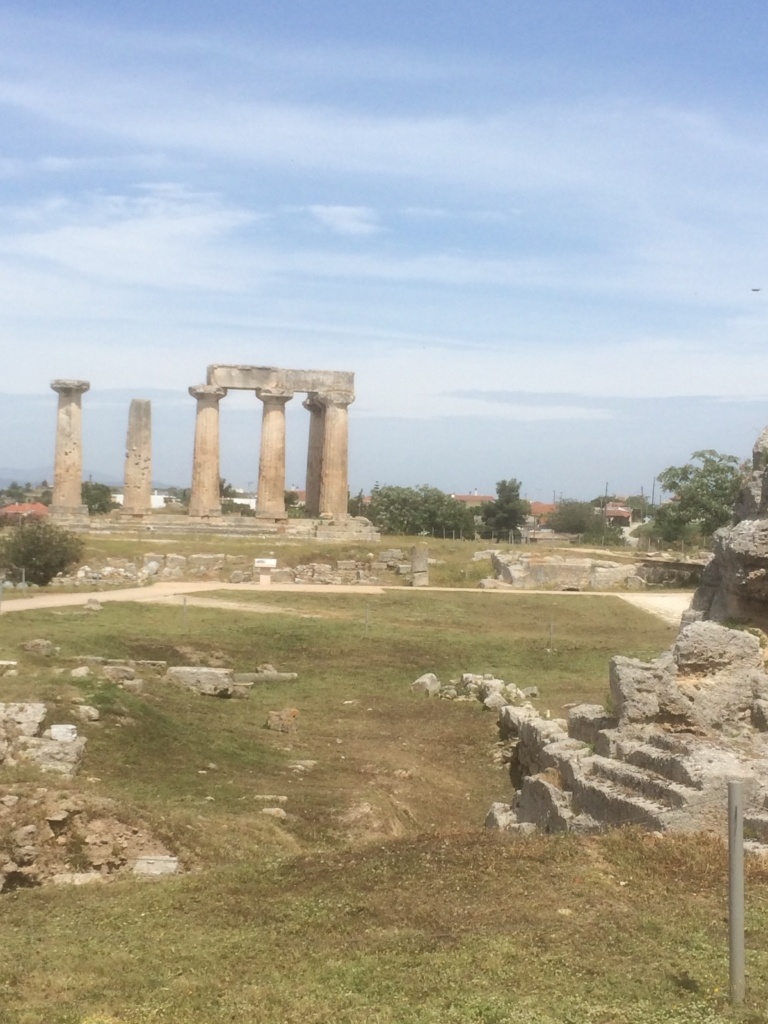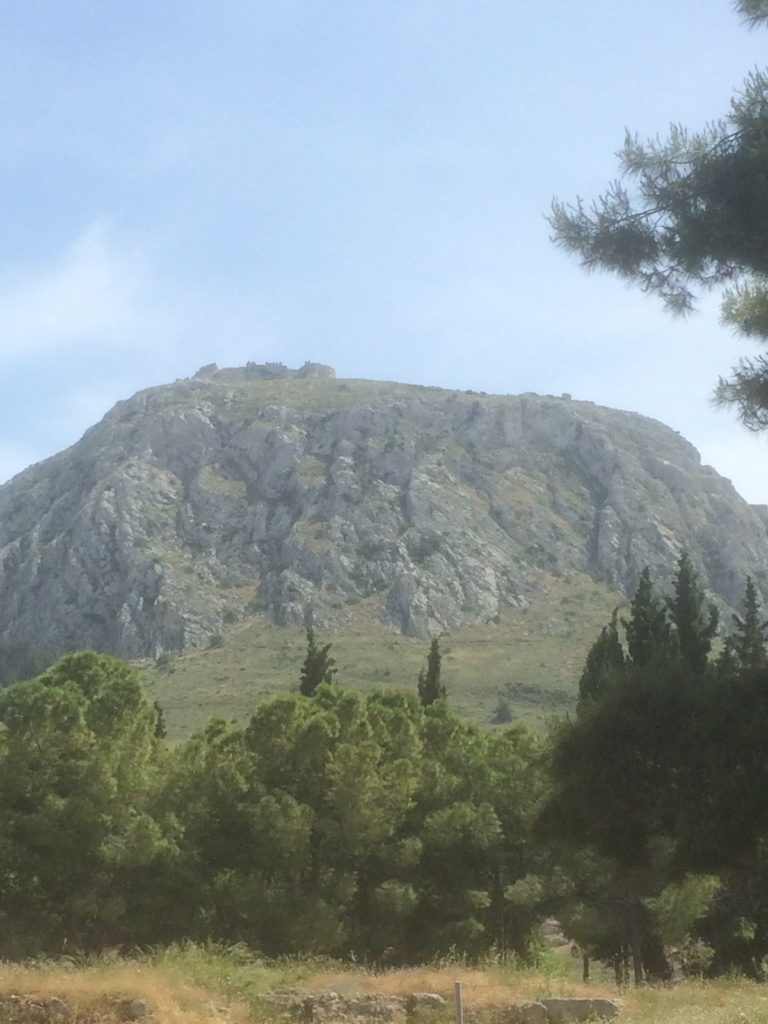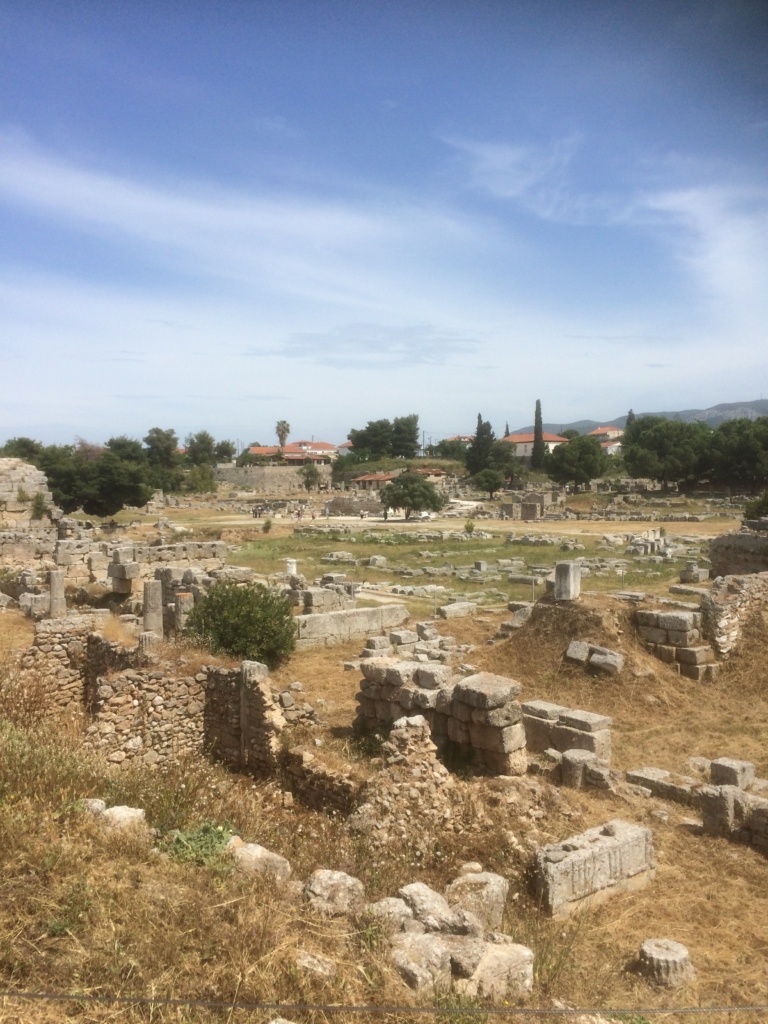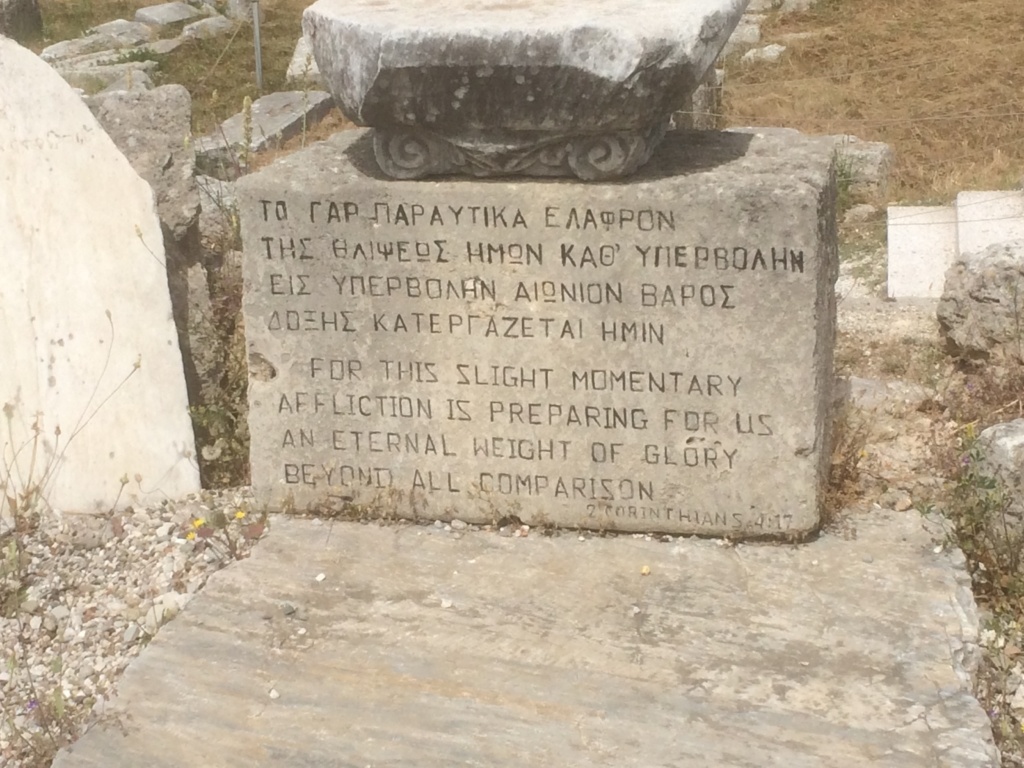Over four talks Bishop Steven is exploring God’s mission in Macedonia, in Greece and in the great city of Ephesus. In session three he invites us to imagine the effects of early Christianity in Ephesus… ‘it’s as if Bicester Village and the Westgate Centre in Oxford decided it was not worth opening on Sundays any more and signed petitions against the church and the effects on local business.’
This page includes images and text by the Revd Janet Minkkinen of St Andrew’s Church Cippenham who is on pilgrimage. If you would prefer to watch +Steven teach this session, scroll to the bottom of this page for the video.
Session 3: Ephesus
One of the most moving and powerful scenes in the Acts of the Apostles is the picture of Paul walking alone into Ephesus: a major city of the Empire, larger than anywhere he has yet proclaimed the gospel. Ephesus is the stronghold of the cult of Artemis. It is a cultural crossroads between East and West and the gateway to Asia Minor and the Eastern Empire. Paul arrives alone. He is putting out now into very deep water indeed.
The mission to Ephesus is sometimes called the third missionary journey. In fact, it’s a two-year ministry in a single city which has an effect on the whole region. The story of mission to Ephesus is told over two chapters and draws to a close the middle section of Acts which began in Antioch in Acts 13 with the sending out of Paul and Barnabas.
This is the high point of Paul’s ministry. The third section of Acts, 21-28, is sometimes called the Passion of St Paul. Acts 21-28 describes Paul’s arrest and various trials and imprisonments on his way to Rome in chains.
The lessons of deep water fishing are here again, of course. The Holy Spirit is guide and director. Again at the beginning of a new ministry, Luke makes deliberate reference to the Holy Spirit. There is a sense that God is already at work. Paul finds 12 disciples who believe in Jesus. These Christians have not been taught the whole of the faith. Their catechesis is incomplete.
There is a question and answer session perhaps based around an early catechism:
Do you believe and trust in God the Father who made the world?
Yes, Paul, we believe and trust in him.
Do you believe and trust in his Son Jesus Christ who redeemed the world and rose again?
Yes, Paul. Apollos told us about Jesus and we have been baptised.
Did you receive the Holy Spirit when you became believers?
No. We have not even heard that there is a Holy Spirit.
In Macedonia, Luke emphasises the ways in which God is already at work in the lives of individuals and the many different ways people come to faith. In Greece, Luke stresses the different responses to the gospel in different places and the need to persevere through difficulties.
In Ephesus, the stress is on the cornerstone of ministry. Paul grounds his ministry on good catechesis. His first priority is to lay a sure and full foundation of Christian faith in the lives of the new believers. They are taught and baptised and into the name of the Lord Jesus. Paul lays his hands on them. There is a new Pentecost: they speak in tongues and prophesy. Luke says rather coyly, “There were about 12 of them”. He is making a theological point.
There is then courage and perseverance in the face of difficulty. When one opportunity ends, another begins. Obstacles become opportunities.
“He entered the synagogue and for three months spoke out boldly and argued persuasively about the kingdom of God. When some stubbornly refused to believe and spoke evil of the Way before the congregation, he left them, taking the disciples with him, and argued daily in the lecture hall of Tyrannus. This continued for two years, so that all the residents of Asia, both Jews and Greeks, heard the word of the Lord”.
This is careful, intentional, daily formation of enquirers in a safe and neutral space which extends over a long period of time. This is catechesis. This is one of the essential building blocks of making disciples and of forming new congregations. This is the ministry about which we have so much to learn. This is part of what it means to put out into deep water. There is nothing shallow or superficial about the faith Paul is teaching, and the Ephesians are learning.
(scroll down to continue)
Janet writes: “I have spent my last day at Corinth and Cenchreae as we said farewell to Paul as he journeys to Ephesus. So we read Acts 18. One night the Lord said to Paul in a vision. ‘Do not be afraid, but speak and do not be silent; for I am with you.’ In our world were sometimes we are afraid, let us place our fears with God, let us open our hearts so that our Lord will strengthen them, let us be like Paul and speak of God’s love to all people in all places in our words and actions and use every opportunity courageously to bear witness.” – 20 May 2019
All the lessons Paul has learned are focussed here. The ministry is extraordinarily effective. All the residents of Asia, both Jews and Greeks, heard the word of the Lord. There are extraordinary miracles, signs and wonders as there have been in times of great revival. There are unorthodox methods not repeated in any other place: the blessing of handkerchiefs and aprons; healings and exorcisms. There are signs of spiritual battle and spiritual victory.
Most significantly, there are massive changes in the lifestyle and economy of the city. The hold of the practice of magic and the occult on the city is broken.
“A number of those who practised magic collected their books and burned them publicly, and when the value of these books was calculated, it was found to come to fifty thousand silver coins”.
If a silver coin is a year’s wages, we are talking millions of pounds in today’s values.
The economy of the region is changed so significantly that the livelihood of the silversmiths is threatened. The silversmiths make shrines of Artemis for the pilgrims who come to Ephesus. Demetrius, their leader, stirs up the city to rioting. It is a measure of Paul’s courage that he wants to address the assembly. Where we might have seen a dangerous mob, Paul sees only a potential congregation. Only with great difficulty is the riot stilled and calm returns.
It takes some doing to imagine the effects of early Christianity in Ephesus. It is as if the gospel was preached to such effect that every betting shop and bingo hall in Milton Keynes closed down for lack of business. It is as if Bicester Village and the Westgate Centre in Oxford decided it was not worth opening on Sundays any more and signed petitions against the church and the effects on local business. This is an enormous change. It provokes very significant opposition.
We will look a little more in session four at what happens in Ephesus as we read Acts 20. But what are the lessons for deep water fishing we might take from today?
Each of our first four lessons are here.
- The Holy Spirit is guide and director of God’s mission
- God works in unexpected ways and unexpected people
No-one would build a strategy on handkerchiefs and aprons. We have to respond to events not simply roll out a predetermined strategy. - Different places respond in different ways to the gospel
Ephesus is clearly more fruitful than elsewhere for a range of reasons. - We need to be courageous, to persevere, to try, try and try again.
This is exactly what Paul is doing through every twist and turn.
There is I think a fifth lesson in Ephesus when we combine what is said in Acts 19 with the retrospective in Acts 20. In Acts 19, we read of the daily teaching in the Hall of Tyrannus. In Acts 20, Paul looks back at the ways in which his ministry in Ephesus is founded on this deep sustained ministry of Christian formation through teaching and encounter with Christ: on catechesis.
Paul will look back on his ministry with these words:
“I did not shrink from doing anything helpful, proclaiming the message to you and teaching you publicly and from house to house, as I testified to both Jews and Greeks about repentance towards God and faith towards our Lord Jesus” (20.20-21). Later in the same speech, Paul will say: “For I did not shrink from declaring to you the whole purpose of God”.
So my fifth lesson for deep water fishing is this:
Social transformation is founded on deep Christian formation.
In Ephesus, the whole economy of the region begins to be transformed. But the heart of that renewal is deep Christian formation: teaching and encounter with God.
We are at a really significant point in the life of our own nation. The tide of knowledge and understanding of the Christian faith has been going out for some time. People know less and less about Christian faith. They have fewer and fewer resources to cope with change and the demands of life and suffering and grief. The fragmentation in our society is clear.
There are many things we want to see changed, and it is very good to work in partnership where we can with other faiths and people of good will on the great issues of our day.
But deep change and transformation in society comes as children and young people, women and men encounter the living Christ in the power of the Spirit. This has happened in the life of our country many times in the past: in the time of Cuthbert and Augustine of Canterbury; at the Reformation; in the time of Richard Baxter of Kidderminster; in the time of the Wesleys.
We need again in the 21st century a deep investment in the whole of the Church of England such that every parish church becomes again what it is designed to be: a place of Christian formation and catechesis; a place for learning and teaching the faith and encountering Christ again. Social transformation is founded on deep Christian formation.
As children and young people and women and men encounter Christ and our lives are reshaped and re-ordered, and we are equipped in our discipleship then we live out our faith in every area of our lives. We gather as a church for worship, which renews and deepens our faith and understanding week by week and month by month. As we do that, then the world begins to be changed and transformed. Social transformation is founded on deep Christian foundation.
The centre of our renewal in mission and ministry, for me, is this renewal of every church and every new congregation as a place of Christian formation. This vision flows from our journey to be a more Christ-like Church: more contemplative, more compassionate and more courageous. Our greatest gift to the world is the gift of a new generation of mature Christian disciples.
The renewal of catechesis may not feature in any single funding bid to our new mission fund. It may be as simple as following an annual cycle of sowing the seed of the gospel, nurturing faith, bringing people to baptism and confirmation, ongoing growth through personal discipleship plans and firepits. But this is the way the local church goes on to transform the world. This is what it means to put out into deep water wherever we are and to have confidence in the message we are called to bear.
This is the key transformation our whole Church of England needs: to have such confidence in the gospel that every parish church becomes again a place of deep Christian formation where the whole faith is taught which will lead again to deep social transformation across our nation.
That will happen first through a renewed confidence in God and in the Christian gospel which does not depend on numbers or visible results: which receives with thanksgiving the fruit we can see and trusts in God for the fruit we cannot.
It will happen second through the cherishing of individuals and families and doing all we can to teach the faith to small numbers of people in thousands of different places. It will happen third through sufficient depth in our formation to embrace pain and difficulty and suffering as well as the good and joyous elements in our lives.
May God give us grace to put out into deep water and let down our nets for the renewal of these ministries.
Let us pray.
God of love
The sea is so great and our boat is so small.
Inspire your church as we put out into deep water
Help us to be contemplative, compassionate and courageous in your mission.
Guide us by your Spirit to discover where you are working
Help us to join in the building of your kingdom
And anoint us afresh to make disciples in your name
For the sake of your Son Jesus Christ who calls us and sends us
With you and the Holy Spirit, one God now and for ever. Amen.
+Steven
Common Vision Conference
High Leigh, session 3, 9 May 2019
Watch Bishop Steven deliver this talk
This session was first given at the Common Vision Conference in May 2019.
Click the speaker icon in the bottom right of the video frame to switch on audio.







